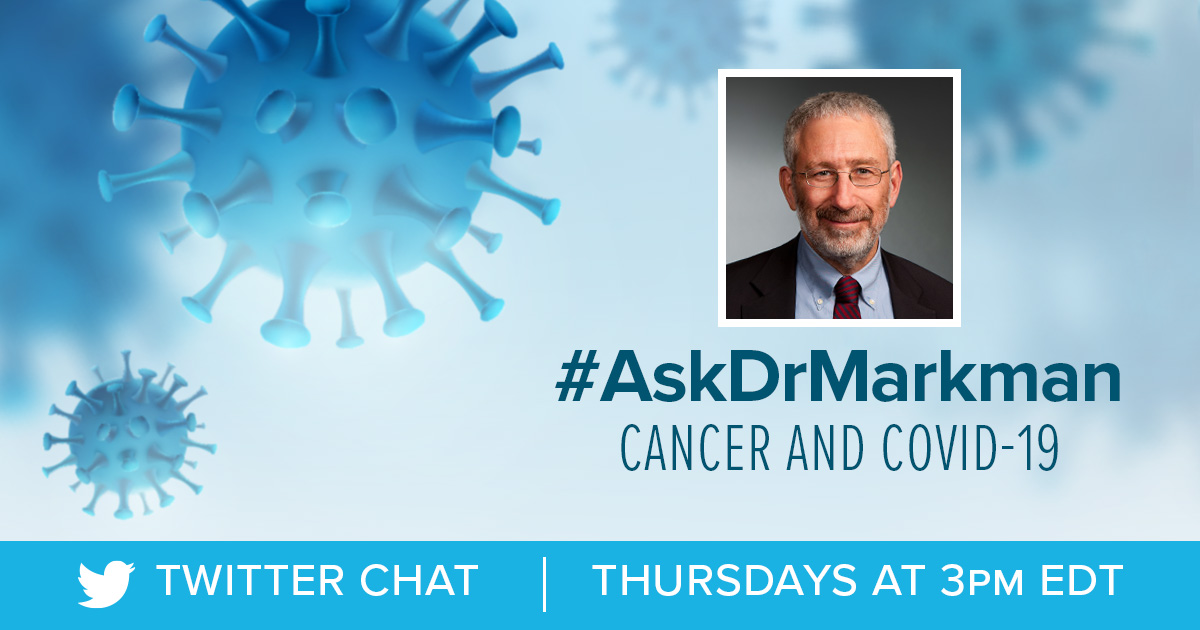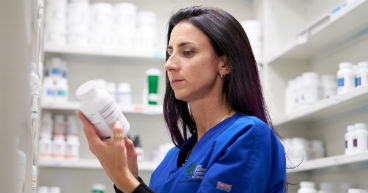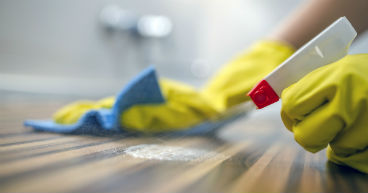
The COVID-19 pandemic has created a constantly evolving flow of new and sometimes confusing information. Cancer patients have many questions about how the virus may affect them, their access to ongoing treatments, their overall health and steps they can take to help reduce risk of infection. Maurie Markman, MD, President of Medicine & Science at Cancer Treatment Centers of America® (CTCA), has launched a weekly Q&A hosted on Twitter to answer your questions, in real time and as questions are sent to us online and by phone. Follow us at #AskDrMarkman. Here’s this week’s chat:
Question: As a cancer patient, I’m concerned about getting infected with COVID-19, and I know it’ll take time to develop a vaccine. Is there any chance we can reach herd immunity before then?
Answer: So-called “herd immunity” from a viral infection (when enough people have been infected that its spread is unlikely) is believed to be a realistic possibility, but only when about 60 percent (or more) of the population is immune. Unfortunately, current evidence suggests that, even in areas that are seeing large numbers of cases, the percentage of the population that’s infected remains far too low to have an impact on spread. For example, a detailed report from France recently found that about 3.5 million people, or 5.3 percent of the population, had been infected.
Q: I recently had breast conservation surgery for breast cancer, and my doctor told me that if I need radiation, it may be delayed because of COVID-19. Should I be worried?
A: I can’t offer you any medical advice here. Instead, I’d suggest you speak with your oncologist regarding any concerns you may have. However, I will point out that a recent report in a major medical journal noted that several studies have suggested a delay of a number of weeks in getting radiation treatments after breast-conserving surgery did not have a negative impact on outcome.
Q: My primary care physician has finally told me it’s OK to resume my routine cancer screening. Have other people had to delay cancer screenings due to COVID-19?
A: Yes. Cancer screenings, like many other important routine medical visits and procedures, have been deferred in many regions of the country since early March. In fact, Epic, a large electronic medical record company that tracks such activities as a component of its care algorithm, reported that screenings for breast cancer, colon cancer and cervical cancer in mid-June were 20 to 30 percent lower than normal for this time of year.
Q: I’m a lung cancer survivor, and I’m really worried that if I get COVID-19, I’ll have to be hospitalized. Are we learning more about how to prevent serious complications from this virus?
A: Yes, the medical community has learned a great deal about how to manage serious COVID-19 infections. In fact, two medications (remdesivir and dexamethasone) were shown in phase 3 clinical trials to improve outcomes. But, unfortunately, there remains much to learn, and serious COVID-19 infections can be fatal, particularly in the elderly and those with significant pre-existing medical conditions. In fact, a recent report from a hospital in Italy that treated a large number of COVID-19 patients noted that patients who were severely overweight (BMI > 35) had a substantially heightened risk for getting seriously ill with the virus.
Q: How common are COVID-19 cases in the United States?
A: This is an important question, but it’s difficult to provide a definitive answer. In fact, as you may note in listening to media reports, the estimate of Americans infected by the virus has changed over time—dramatically in some places. However, a recently reported study of antibodies in 16,000 people in 10 locations suggested that the actual number of COVID-19 infections in the United States may be 10 times higher than the number of confirmed cases.
Q: As a two-time cancer survivor, I’ve been careful to follow social distancing guidelines, but this has been hard. When can we expect to be able to have more freedom to get out?
A: I sympathize with your frustration. Social distancing strategies are critically important, but they’ve also had a major, negative impact on a number of routine, everyday activities. While scientifically confirmed strategies can be used to ease social distancing protocols, the World Health Organization has recommended that any community with more than 5 percent positive testing for active COVID-19 infections continue to engage in active social distancing. To put things into perspective, today, the overall U.S. positivity rate is 7.8% (7-day moving average)--that's an 81 percent increase from the low point in June.
Q: I recovered from a COVID-19 infection in April, but I want to make sure I don’t infect my mother, who’s being treated for breast cancer. Can I still get sick?
A: The question of immunity from a future COVID-19 infection among those who’ve recovered from an infection is among the most important issues confronting public health officials today. While definitive answers are not yet available, it’s interesting to note that the Swedish Public Health Agency suggested that immunity can last for at least six months after recovering from COVID-19, whether or not antibodies are detected.
Q: Even though hydroxychloroquine hasn’t helped seriously ill COVID-19 patients, is there any evidence that it may prevent an early infection from becoming more serious?
A: There’s certainly a continuum of stages of COVID-19, from early, asymptomatic infection, to non-hospitalized, symptomatic infection, to more seriously cases that require hospitalization. Even death. But a recently reported, well-designed, randomized trial of symptomatic outpatients with probable or confirmed early COVID-19 did not show any benefit associated with taking hydroxychloroquine compared to a placebo.
Q: How much more likely is COVID-19 to spread inside a household, compared to non-household contacts?
A: This is a relevant question, especially as some communities continue to plan to return to a more “normal” routine, including opening schools and multiple businesses and community facilities. While circumstances will vary based on multiple factors, a recent, detailed report from South Korea suggested that COVID-19 transmission was six times more likely to spread among members of a household versus non-household settings.
Q: With schools planning to reopen this fall, do we know more about the risk children can spread COVID-19 to adults?
A: The potential for spread of COVID-19 when children return to school is clearly on the minds of school leaders, public health officials, teachers and parents. As it should be. A recent study suggested that children younger than 10 have a low likelihood of spreading the virus, but older children and adolescents (10-19 years old) may be able to spread the virus as efficiently or even better than adults. As schools reopen, the risk of spread within classrooms, among school staff and within households of affected students will need to be carefully monitored, with important strategies implemented to reduce the risk as much as possible.
Concerned about your cancer risk? Try our Risk Management Tool.



